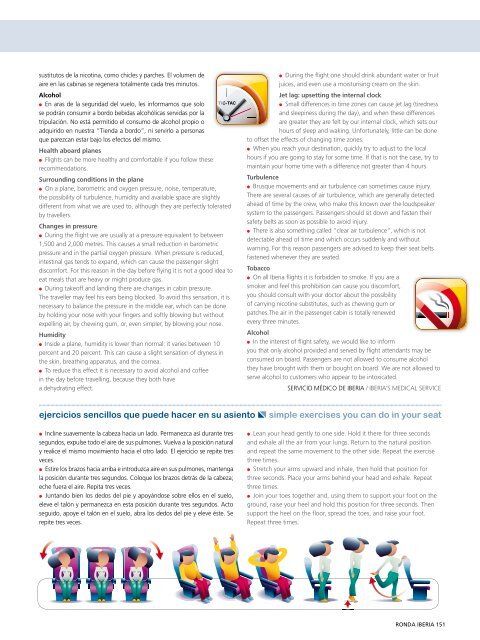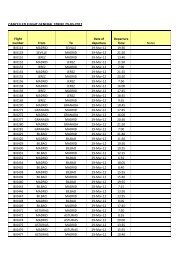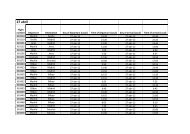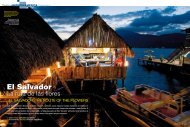Iberia al día 134 The latest from iberia Noticias de Iberia 136 Iberia ...
Iberia al día 134 The latest from iberia Noticias de Iberia 136 Iberia ...
Iberia al día 134 The latest from iberia Noticias de Iberia 136 Iberia ...
Create successful ePaper yourself
Turn your PDF publications into a flip-book with our unique Google optimized e-Paper software.
sustitutos <strong>de</strong> la nicotina, como chicles y parches. El volumen <strong>de</strong><br />
aire en las cabinas se regenera tot<strong>al</strong>mente cada tres minutos.<br />
Alcohol<br />
● En aras <strong>de</strong> la seguridad <strong>de</strong>l vuelo, les informamos que solo<br />
se podrán consumir a bordo bebidas <strong>al</strong>cohólicas servidas por la<br />
tripulación. No está permitido el consumo <strong>de</strong> <strong>al</strong>cohol propio o<br />
adquirido en nuestra “Tienda a bordo”, ni servirlo a personas<br />
que parezcan estar bajo los efectos <strong>de</strong>l mismo.<br />
He<strong>al</strong>th aboard planes<br />
● Flights can be more he<strong>al</strong>thy and comfortable if you follow these<br />
recommendations.<br />
Surrounding conditions in the plane<br />
● On a plane, barometric and oxygen pressure, noise, temperature,<br />
the possibility of turbulence, humidity and available space are slightly<br />
different <strong>from</strong> what we are used to, <strong>al</strong>though they are perfectly tolerated<br />
by travellers.<br />
Changes in pressure<br />
● During the flight we are usu<strong>al</strong>ly at a pressure equiv<strong>al</strong>ent to between<br />
1,500 and 2,000 metres. This causes a sm<strong>al</strong>l reduction in barometric<br />
pressure and in the parti<strong>al</strong> oxygen pressure. When pressure is reduced,<br />
intestin<strong>al</strong> gas tends to expand, which can cause the passenger slight<br />
discomfort. For this reason in the day before flying it is not a good i<strong>de</strong>a to<br />
eat me<strong>al</strong>s that are heavy or might produce gas.<br />
● During takeoff and landing there are changes in cabin pressure.<br />
<strong>The</strong> traveller may feel his ears being blocked. To avoid this sensation, it is<br />
necessary to b<strong>al</strong>ance the pressure in the middle ear, which can be done<br />
by holding your nose with your fingers and softly blowing but without<br />
expelling air, by chewing gum, or, even simpler, by blowing your nose.<br />
Humidity<br />
SMS<br />
27775<br />
SMS<br />
27775<br />
● Insi<strong>de</strong> a plane, humidity is lower than norm<strong>al</strong>: it varies between 10<br />
percent and 20 percent. This can cause a slight sensation of dryness in<br />
the skin, breathing apparatus, and the cornea.<br />
● To reduce this effect it is necessary to avoid <strong>al</strong>cohol and coffee<br />
in the day before travelling, because they both have<br />
a <strong>de</strong>hydrating effect.<br />
TIC-TAC<br />
● During the flight one should drink abundant water or fruit<br />
juices, and even use a moisturising cream on the skin.<br />
Jet lag: upsetting the intern<strong>al</strong> clock<br />
● Sm<strong>al</strong>l differences in time zones can cause jet lag (tiredness<br />
mmHg<br />
and sleepiness during the day), and when these differences<br />
are greater they are felt by our intern<strong>al</strong> clock, which sets our<br />
hours of sleep and waking. Unfortunately, little can be done<br />
to offset the effects of changing time zones.<br />
● When you reach your <strong>de</strong>stination, quickly try to adjust to the loc<strong>al</strong><br />
hours if you are going to stay for some time. If that is not the case, try to<br />
maintain your home time with a difference not greater than 4 hours.<br />
Turbulence<br />
● Brusque movements and air turbulence can sometimes cause injury.<br />
<strong>The</strong>re are sever<strong>al</strong> causes of air turbulence, which are gener<strong>al</strong>ly <strong>de</strong>tected<br />
ahead of time by the crew, who make this known over the loudspeaker<br />
system to the passengers. Passengers should sit down and fasten their<br />
safety belts as soon as possible to avoid injury.<br />
● <strong>The</strong>re is <strong>al</strong>so something c<strong>al</strong>led “clear air turbulence”, which is not<br />
<strong>de</strong>tectable ahead of time and which occurs sud<strong>de</strong>nly and without<br />
warning. For this reason passengers are advised to keep their seat belts<br />
fastened whenever they are seated.<br />
Tobacco<br />
● On <strong>al</strong>l <strong>Iberia</strong> flights it is forbid<strong>de</strong>n to smoke. If you are a<br />
smoker and feel this prohibition can cause you discomfort,<br />
you should consult with your doctor about the possibility<br />
of carrying nicotine substitutes, such as chewing gum or<br />
TIC-TAC<br />
patches.<strong>The</strong> air in the passenger mmHg cabin is tot<strong>al</strong>ly renewed<br />
every three minutes.<br />
Alcohol<br />
● In the interest of flight safety, we would like to inform<br />
you that only <strong>al</strong>cohol provi<strong>de</strong>d and served by flight attendants may be<br />
consumed on board. Passengers are not <strong>al</strong>lowed to consume <strong>al</strong>cohol<br />
they have brought with them or bought on board. We are not <strong>al</strong>lowed to<br />
serve <strong>al</strong>cohol to customers who appear to be intoxicated.<br />
SERVICIO MÉDICO DE IBERIA / IBERIA’S MEDICAL SERVICE<br />
ejercicios sencillos que pue<strong>de</strong> hacer en su asiento x{ simple exercises you can do in your seat<br />
● Incline suavemente la cabeza hacia un lado. Permanezca así durante tres<br />
segundos, expulse todo el aire <strong>de</strong> sus pulmones. Vuelva a la posición natur<strong>al</strong><br />
y re<strong>al</strong>ice el mismo movimiento hacia el otro lado. El ejercicio se repite tres<br />
veces.<br />
● Estire los brazos hacia arriba e introduzca aire en sus pulmones, mantenga<br />
la posición durante tres segundos. Coloque los brazos <strong>de</strong>trás <strong>de</strong> la cabeza;<br />
eche fuera el aire. Repita tres veces.<br />
● Juntando bien los <strong>de</strong>dos <strong>de</strong>l pie y apoyándose sobre ellos en el suelo,<br />
eleve el t<strong>al</strong>ón y permanezca en esta posición durante tres segundos. Acto<br />
seguido, apoye el t<strong>al</strong>ón en el suelo, abra los <strong>de</strong>dos <strong>de</strong>l pie y eleve éste. Se<br />
repite tres veces.<br />
● Lean your head gently to one si<strong>de</strong>. Hold it there for three seconds<br />
and exh<strong>al</strong>e <strong>al</strong>l the air <strong>from</strong> your lungs. Return to the natur<strong>al</strong> position<br />
and repeat the same movement to the other si<strong>de</strong>. Repeat the exercise<br />
three times.<br />
● Stretch your arms upward and inh<strong>al</strong>e, then hold that position for<br />
three seconds. Place your arms behind your head and exh<strong>al</strong>e. Repeat<br />
three times.<br />
● Join your toes together and, using them to support your foot on the<br />
ground, raise your heel and hold this position for three seconds. <strong>The</strong>n<br />
support the heel on the floor, spread the toes, and raise your foot.<br />
Repeat three times.<br />
RONDA IBERIA 151





